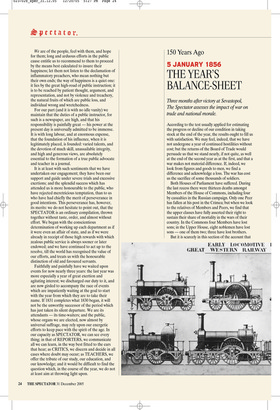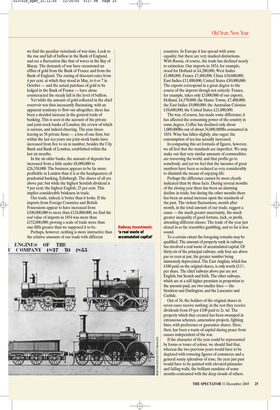150 Years Ago 5 JANUARY 1856
THE YEAR’S BALANCE-SHEET
Three months after victory at Sevastopol, The Spectator assesses the impact of war on trade and national morale.
According to the test usually applied for estimating the progress or decline of our condition in taking stock at the end of the year, the results ought to fill us with satisfaction. We may feel, indeed, that we have not undergone a year of continued hostilities without cost; but the returns of the Board of Trade would persuade us that we stand nearly, if not quite, as well at the end of the second year as at the first, and that a war makes not material difference. If, indeed, we look from figures and goods to men, we find a difference and acknowledge a loss. The war has cost us the sacrifice of some thousands of soldiers.
Both Houses of Parliament have suffered. During the last recess there were thirteen deaths amongst Members of the House of Commons, including four by casualties in the Russian campaign. Only one Peer has fallen at his post in the Crimea; but when we look to the relatives of Members and Peers, we find that the upper classes have fully asserted their right to sustain their share of mortality in the wars of their country. In the Commons four Members have lost sons; in the Upper House, eight noblemen have lost sons — one of them two; three have lost brothers.
But it is scarcely in this section of the account that we find the peculiar vicissitude of war-time. Look to the rise and fall of bullion in the Bank of England, and see a fluctuation like that of waves in the Bay of Biscay. The demands of war have occasioned an efflux of gold from the Bank of France and from the Bank of England. The raising of discount-rates from 4 per cent, at which they stood in May, to 6 or 7 in October — and the actual purchase of gold to be lodged in the Bank of France — have alone counteracted the steady fall in the level of bullion.
Yet while the amount of gold collected in the chief reservoir was thus incessantly fluctuating, with an apparent tendency to flow out altogether, there has been a decided increase in the general trade of banking. This is seen in the account of the private and joint-stock banks of London; the review of which is curious, and indeed cheering. The year closes leaving us 58 private firms — a loss of one firm; but within the last ten years our joint-stock banks have increased from five to six in number, besides the City Bank and Bank of London, established within the last six months.
In the six older banks, the amount of deposits has increased from a little under £8,000,000 to £26,338,000. The business appears to be far more profitable in London than it is at the headquarters of prudential banking, Edinburgh. The shares of all are above par; but while the highest Scottish dividend is 9 per cent; the highest English, 25 per cent. This implies considerable briskness in trade.
Our trade, indeed, is better than it looks. If the imports from Foreign Countries and British Possessions appear to have increased from £100,000,000 to more than £124,000,000, we find the real value of imports in 1854 was more than £152,000,000; proving a scale of trade more than one-fifth greater than we supposed it to be.
Perhaps, however, nothing is more instructive than the relative amounts of our trade with different countries. In Europe it has spread with some equality; but there are very marked distinctions. With Russia, of course, the trade has declined nearly to extinction. Our imports in 1854, for example, stood for Holland at £4,200,000, West Indies £5,000,000, France £7,400,000, China £10,600,000, East Indies £11,800,000, United States £30,000,000. The exports correspond in a great degree to the course of the imports though not entirely: France, for example, takes only £3,000,000 of our exports; Holland, £4,570,000; the Hanse Towns, £7,400,000; the East Indies £9,000,000; the Australian Colonies £10,600,000; the United States £21,000,000.
The war, of course, has made some difference; it has affected the consuming power of the country in some degree. Coffee has declined only about 1,000,000lbs out of about 34,000,000lbs consumed in 1854. Wine has fallen slightly, also sugar; the consumption of tea has actually increased.
In comparing this set formula of figures, however, we all feel that the standards are imperfect. We may make out that very similar amounts of commodities are traversing the world, and that profits go to somebody; and yet we feel that the incomes of great numbers have been so reduced as very considerably to diminish the means of enjoying life.
Perhaps the difference cannot be more clearly indicated than by these facts. During several months of the closing year there has been an alarming decline in trade; but during the other months there has been an actual increase upon the standards of the past. The violent fluctuations, month after month, in the total amount of our trade, suggest a cause — the much greater uncertainty, the much greater inequality of good fortune, luck, or profit, attending different classes. The trade of the year just closed in so far resembles gambling, and so far is less sound.
To a certain extent the foregoing remarks may be qualified. The amount of property sunk in railways has involved a real waste of accumulated capital. Of thirty-six of the principal railways, only four are above par or even at par; the greater number being immensely depreciated. The East Anglian, which has £100 paid on the original shares, is only worth £113/4 per share. The chief railways above par are not English, but Scotch and Irish. The other railways, which are at a still higher premium in proportion to the amount paid, are two smaller lines — the Stockton and Darlington, and the Lancaster and Carlisle.
Out of 36, the holders of the original shares in seven cases receive nothing; in the rest they receive dividends from £9 per £100 paid to 2s. 6d. The property which they created has been swamped in extraneous schemes, annexation projects, fighting lines, with preference or guarantee shares. Here, then, has been a waste of capital during peace from causes independent of the war.
If the character of the year could be represented by forms or tones of colour, we should find that, whereas the two previous years would have to be depicted with towering figures of commerce and a general sunny splendour of tone, the year just past would have to be painted with elevated pinnacles and falling walls, the brilliant sunshine of some months contrasted with the deep clouds of others.


















































 Previous page
Previous page